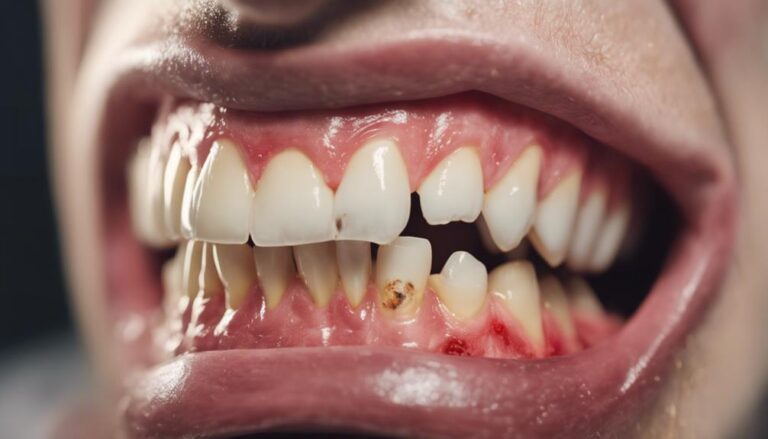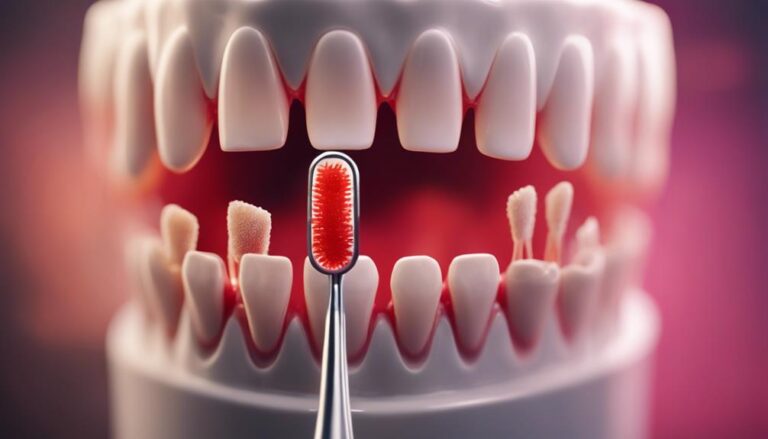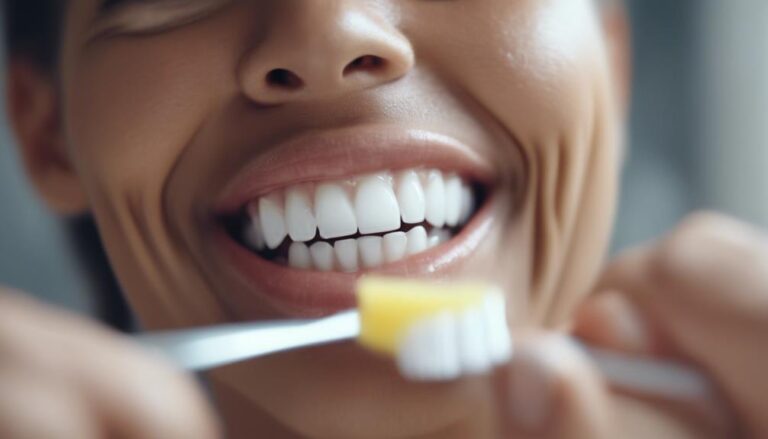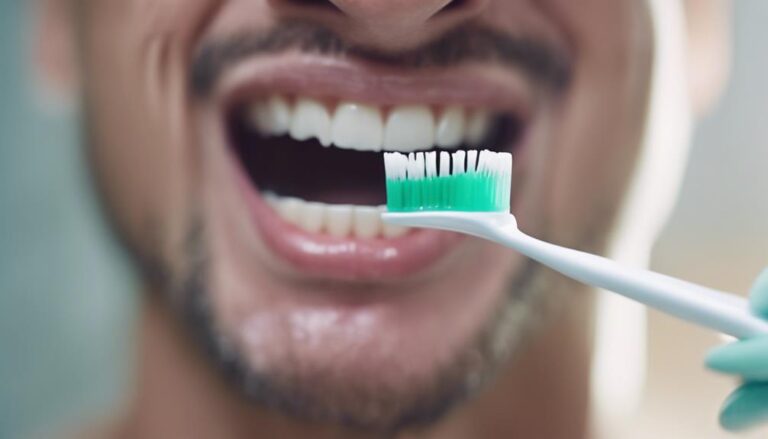To combat bad breath and gum disease, I recommend these top 10 steps: Use a soft-bristled toothbrush at a 45-degree angle with gentle circular motions for at least two minutes. Replace the toothbrush every 3–4 months and floss daily. Clean your tongue, choose alcohol-free mouthwash, and stay hydrated. Opt for a diet rich in fruits, vegetables, and dairy, avoiding sugary foods. Manage stress with relaxation techniques and exercise. Monitor symptoms like bad breath and bleeding gums. Maintain good oral hygiene, seek professional dental care regularly, and avoid tobacco products. These steps can make a significant impact on oral health.
Key Takeaways
- Maintain proper oral hygiene practices daily.
- Choose a balanced diet to support oral health.
- Manage stress levels to reduce gum disease risk.
- Regularly monitor oral health for early detection.
- Visit a dentist for professional care and advice.
Brushing Techniques
To effectively combat bad breath and gum disease, I recommend starting with mastering proper brushing techniques. Proper technique is vital for maintaining good oral hygiene.
Firstly, make sure you’re using an effective tool like a soft-bristled toothbrush that can reach all areas of your mouth. Hold the brush at a 45-degree angle to your gums and make gentle circular motions. Avoid scrubbing too hard, as this can damage your gums and enamel.
Brushing should last for a minimum of two minutes to guarantee all surfaces are cleaned thoroughly. Remember to brush your tongue as well since bacteria can accumulate there and contribute to bad breath. Effective tools also include fluoride toothpaste, which helps prevent cavities and strengthens enamel.
Replace your toothbrush every three to four months or sooner if the bristles are frayed. By mastering proper brushing techniques and using effective tools, you can significantly reduce the risk of bad breath and gum disease.
Flossing Daily
Mastering proper brushing techniques sets the foundation for excellent oral health, and complementing this with daily flossing is vital in preventing gum disease and bad breath. Flossing daily helps remove plaque and food particles that brushing alone may not reach.
To floss effectively, it’s important to use the proper technique. Begin by taking about 18 inches of floss and wrapping it around your middle fingers, leaving about 1-2 inches of floss to work with. Gently slide the floss between your teeth using a back-and-forth motion, making sure to curve it into a C shape around the base of each tooth. Be careful not to snap the floss or use too much force, as this can harm your gums.
Consistent daily flossing, done correctly, yields effective results in reducing plaque buildup and maintaining healthy gums, ultimately contributing to fresher breath and overall oral health.
Tongue Cleaning
Regularly cleaning your tongue is an important step in maintaining fresh breath and overall oral hygiene. The tongue’s surface is a haven for bacteria that can lead to bad breath if not properly addressed. By gently using a tongue scraper or your toothbrush to clean the tongue, you can effectively remove this buildup of bacteria, preventing it from causing unpleasant odors.
In addition to bacteria removal, tongue cleaning is vital for taste bud care. Taste buds are located on the tongue’s surface, and keeping them clean enhances your ability to taste flavors accurately. Neglecting tongue hygiene can lead to a coated tongue, which not only impacts taste but also contributes to bad breath.
Incorporating tongue cleaning into your daily oral hygiene routine alongside brushing and flossing can greatly improve your overall oral health. It’s a simple yet impactful practice that promotes fresh breath and supports your oral hygiene efforts. So, don’t forget to clean your tongue regularly for a healthier mouth and a more pleasant breath.
Mouthwash Selection
Choosing the right mouthwash is essential for maintaining excellent oral health and fighting problems like bad breath and gum disease. When selecting a mouthwash, consider opting for alcohol-free options to avoid the drying effect that alcohol can have on the mouth. Look for mouthwashes with natural ingredients, such as tea tree oil or aloe vera, known for their antibacterial properties that can help combat bad breath and gum disease.
In addition to natural ingredients, mouthwashes containing fluoride offer benefits such as strengthening enamel and preventing tooth decay. Fluoride is particularly important for individuals at risk of cavities. Moreover, mouthwashes with antiseptic properties can help reduce bacteria in the mouth, promoting healthier gums and fresher breath.
Hydration Importance
Maintaining proper hydration is essential for overall oral health and plays a vital role in preventing issues like bad breath and gum disease. Water intake is important for saliva production, which helps cleanse the mouth by washing away food particles and neutralizing acids that can lead to tooth decay and gum disease. As an individual committed to mastering oral health, incorporating an adequate amount of water into your daily routine is paramount.
Hydration also supports your hygiene routine by keeping the tissues in your mouth healthy and moist, reducing the risk of inflammation and infections. When you’re well-hydrated, saliva helps to protect your teeth and gums against bacteria that cause bad breath and gum disease. Remember to sip water throughout the day, especially after meals, to maintain excellent hydration levels.
Healthy Diet Impact
Ensuring a well-rounded and nutritious diet is essential for promoting excellent oral health and reducing the risk of bad breath and gum disease. Food choices play a vital role in the overall health of our mouths. Opting for a diet rich in fruits, vegetables, whole grains, lean proteins, and dairy products can have a positive nutritional impact on our oral health.
Certain foods can help combat bad breath and gum disease. For instance, crunchy fruits and vegetables like apples and carrots can help clean teeth naturally and increase saliva production, which aids in washing away food particles and bacteria. Additionally, foods high in vitamin C, such as citrus fruits, can promote healthy gums and prevent gum disease.
On the other hand, sugary and starchy foods can contribute to the development of cavities and gum problems. These foods provide a breeding ground for harmful bacteria that cause bad breath and lead to gum disease. Therefore, making wise food choices and being mindful of the nutritional impact of our diet can greatly benefit our oral health.
Regular Dental Checkups
Regular dental checkups are essential for maintaining excellent oral health and preventing potential issues from escalating. As a dentist, I emphasize the importance of these routine visits to make sure your teeth and gums are in peak condition. Here are three key reasons why regular dental checkups are vital:
- Early Detection: Regular visits allow me to spot any signs of trouble early on, such as cavities, gum disease, or oral cancer. Early detection can lead to more successful treatment outcomes and prevent serious complications.
- Professional Cleaning: Despite regular brushing and flossing, plaque and tartar can still build up in hard-to-reach areas. Professional cleanings during checkups help remove these deposits, reducing the risk of gum disease and bad breath.
- Addressing Dental Anxiety: Many people experience dental anxiety, leading them to avoid dental visits. Through regular checkups, we can work together to alleviate fears, creating a more comfortable experience and promoting better oral health in the long run.
Avoiding Tobacco Products
To further enhance your oral health and reduce the risk of gum disease and bad breath, one essential step is to steer clear of tobacco products. Quitting smoking is vital in preventing the detrimental effects tobacco can have on your gums and overall oral health. Smoking not only stains teeth and contributes to bad breath, but it also weakens the immune system, making it harder for your body to fight off gum infections.
If you’re struggling to quit smoking, consider exploring tobacco alternatives like nicotine patches or gum. These options can help you gradually reduce your dependence on nicotine without exposing your gums to the harmful effects of smoking. Remember, even smokeless tobacco products can irritate your gums and increase the risk of gum disease.
Stress Management
Managing stress effectively is essential for maintaining good oral health and preventing the onset of gum disease and bad breath. Stress can contribute to oral health issues by weakening the immune system and increasing inflammation in the body, making it important to incorporate stress management techniques into your daily routine.
Here are three evidence-based strategies to help you combat stress and protect your oral health:
- Practice Relaxation Techniques: Engaging in relaxation techniques such as deep breathing, progressive muscle relaxation, or yoga can help reduce stress levels and promote overall well-being. These techniques can lower cortisol levels, which in turn may decrease inflammation in the body and improve oral health.
- Mindfulness Practices: Mindfulness involves staying present in the moment without judgment, which can help alleviate stress and anxiety. By practicing mindfulness regularly, you can reduce the impact of stress on your body and potentially lower the risk of developing gum disease.
- Exercise Regularly: Physical activity is known to release endorphins, which are natural mood lifters. Regular exercise can help reduce stress levels and improve overall mental health, which can have a positive impact on your oral health as well.
Monitoring Symptoms
Monitoring symptoms is vital for early detection and intervention in maintaining peak oral health and preventing the progression of gum disease and bad breath. Regularly evaluating changes in oral hygiene and dental care can help in identifying potential issues before they escalate. Signs such as persistent bad breath, bleeding gums, swollen or receding gums, and loose teeth should prompt immediate attention from a dental professional.
When monitoring symptoms, it’s important to keep track of any discomfort, pain, or unusual occurrences in the mouth. Documenting changes in oral health over time can provide valuable information to your dentist and aid in creating an effective treatment plan. Additionally, maintaining a consistent oral hygiene routine and attending regular dental check-ups can contribute to the early detection of gum disease and bad breath, allowing for timely intervention.
Frequently Asked Questions
Can Bad Breath Be a Sign of a Serious Health Condition?
Bad breath can indeed signal underlying health issues. Persistent foul breath may indicate conditions like respiratory infections, diabetes, or liver problems. Early detection is key. Regular dental check-ups, proper oral hygiene, and a healthy lifestyle can aid prevention and treatment.
How Often Should I Replace My Toothbrush for Optimal Oral Health?
Replacing my toothbrush regularly is crucial for excellent oral health. I aim for a new one every 3 months or sooner if bristles fray. Proper brushing technique, storing it away from the toilet, and using fluoride toothpaste are essential practices.
Is It Possible to Overdo It With Mouthwash?
Yes, it is possible to overdo it with mouthwash. Overusing mouthwash can lead to dry mouth, changes in oral microbiome, and reduced effectiveness. It’s important to follow the recommended usage instructions for best mouthwash effectiveness.
Can Gum Disease Be Reversed With Proper Oral Care?
Reversing gum disease through meticulous oral hygiene practices is achievable. Consistent brushing, flossing, and dental check-ups are essential. Neglecting gum health can lead to serious long-term effects, impacting overall health. Prioritizing oral care is vital for preventing health implications.
Are There Specific Foods That Can Help Combat Bad Breath?
Breath freshening snacks like crunchy fruits and vegetables can help combat bad breath by promoting saliva production. Additionally, following proper oral hygiene tips such as brushing and flossing regularly can also contribute to fresher breath.
Conclusion
In the battle against bad breath and gum disease, following these top 10 steps is essential to maintaining oral health.
Just as a well-oiled machine requires regular maintenance to function smoothly, our oral hygiene routine plays a vital role in keeping our mouths healthy.
By incorporating these steps into our daily routine, we can guarantee fresh breath and strong gums for years to come.






